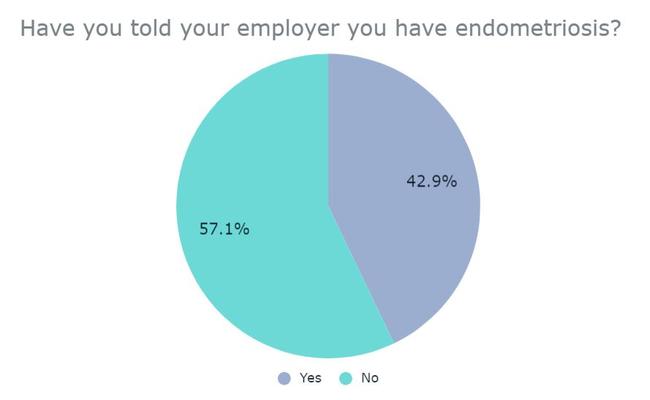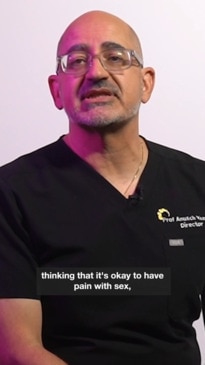Why thousands of Australians are keeping an agonising secret from their bosses
Thousands of Aussies are keeping an agonising secret from their bosses, with many fearing they will lose their jobs if their work ever finds out.

Every week thousands of Australians are heading into work without their bosses knowing they are keeping an agonising secret many fear could cost them their jobs.
It relates to an issue that affects one in nine women, with nearly one million people living with it every day across Australia – though many more are thought to be suffering in silence.
Endometriosis is a condition where tissue similar to that which normally lines the uterus grows in other parts of the body, usually the pelvic region.
It is a chronic condition and, while there are treatments available to help patients manage the disease, there is currently no cure.
Medicare is failing women and it’s About Bloody Time things changed. Around one million suffer from endometriosis. There is no cure. Help is hard to come by and in rural or regional areas, it’s virtually impossible. We are campaigning for longer, Medicare-funded consultations for endometriosis diagnosis and treatment.
The disease can manifest in different ways for different people, but common symptoms include extremely painful periods, bloating, back and leg pain, infertility, excessive bleeding, pain during sex, depression and anxiety.
Some women have described the pain as like “having your insides gnashed by a wild dog”, being “stabbed in the stomach by a hot knives” and many say it is worse than childbirth.
This can have a debilitating effect on their everyday lives, though many live with the added fear they will be punished by their employer if they reveal their diagnosis.
One in six people will lose their employment due to managing endometriosis.
As part of the About Bloody Time campaign, news.com.au surveyed more than 1700 people who suffer from endometriosis to gather insights into how it affects their lives.
The majority of respondents – 57.1 per cent – have chosen not to reveal their diagnosis to their employer. This is despite more than 83 per cent saying they have had to take time off work due to their endo.
While many of those surveyed said their medical information was none of their employer’s business, there were plenty of others who said they held back due to fear of not being taken seriously or being seen as trying to make “excuses” not to work.

Plenty of sufferers also revealed they didn’t feel comfortable confiding in their male managers and were worried they wouldn’t understand or would even “just roll their eyes”.
One respondent, who works in a male-dominated industry, claimed her boss would be more understanding if she told him the reason she needed the day off was because she was “hungover”, rather than to manage an endo flare-up.
While there were a few respondents who felt their current work arrangements already offered enough flexibility that they could manage their condition privately, a shocking number said they stayed quiet out of fear of their career being impacted.
“They would sack me,” one person said.
“Fears I would damage promotion opportunities due to being (seen as) ‘less productive’,” another wrote.
Depressingly, the experiences of women who have confided in their workplaces about their diagnosis shows these fears are far from unfounded.
Common responses revealed employers often acted with annoyance, frustration or even claimed that it was “just a painful period” and advised the employee to take pain killers and keep working.
Other women revealed they felt “humiliated” after disclosing the information, with one person revealing her male employer asked for “very personal” information that she was later told by a doctor she didn’t need to disclose.
Another person said: “I recently passed out in the bathroom due to pain and when I came to, I was weak and shaking and vomiting. I was told that time would come from my lunch break.”


Many revealed the decision to be open about their diagnosis led to them becoming jobless.
“I lost my job because I took too much time off,” one said.
“They were reasonable at first but eventually fired me for needing to take so much time off,” another wrote.
Reading the hundreds of responses, it was clear that the majority of endometriosis sufferers surveyed experienced a negative response when telling their employer about their endometriosis.
However, there were still many others who were met with understanding, support and empathy. This was often credited to their manager being a woman, having endometriosis themself or knowing someone with the disease.
“I was ‘lucky’ because my boss’s sister has endo so he has an understanding. Also, it was very plain to see how much the pain was affecting me every day, not just when I had my period and even after my hysterectomy,” one person revealed.
Others revealed their manager allowed flexible work arrangements, such as working from home and being able to take time off as needed.
One respondent said her work was “very supportive” and allowed her to have three months off for surgery and recovery.
Unfortunately, even those who were offered support still experienced different types of blowback.
“Initially pretty supportive however there seems to be an undercurrent from some co-workers that I am trying to avoid work when I need work adjustments or time off,” one respondent stated.
Another added: “I was lucky because even though my boss at the time was male, his wife suffers from it as well so he knew all about it, but still made jokes about women being the weaker sex.”
And it isn’t just in the workplace where women struggle to have their diagnosis understood, with 54.4 per cent of those surveyed saying they have had mostly negative experiences with doctors and medical professionals.
Shockingly, 17.3 per cent said they have never been taken seriously when seeking medical help for their condition.
Endometriosis can also have a major impact on intimate relationships, with 75.5 per cent saying it has had a negative impact on their sex life and romantic connections.
There is also the monetary cost that needs to be considered, with 52.1 per cent of people revealing they have spent more than $5000 on their treatment.
Of those, 12.2 per cent say they have spent between $20,000 and $50,000, while 8.8 per cent have spent more than $100,000.
Endometriosis can impact every aspect of your life, with these being just some of the experiences from the almost one million Australians who live with the disease.
It takes on average seven years to be diagnosis, which means right now there are countless women across the country still struggling to get answers.
The likelihood of getting a diagnosis and treatment dwindles even more for women who live in rural areas.
About Bloody Time is an editorial campaign by news.com.au that been developed in collaboration with scientists recommended by the Australian Science Media Centre, and with the support of a grant from the Walkley Foundation’s META Public Interest Journalism fund.







